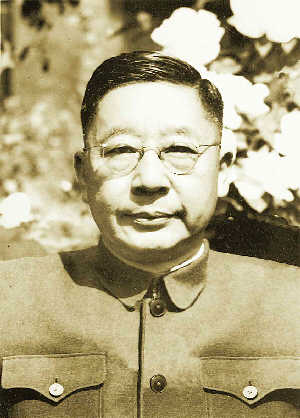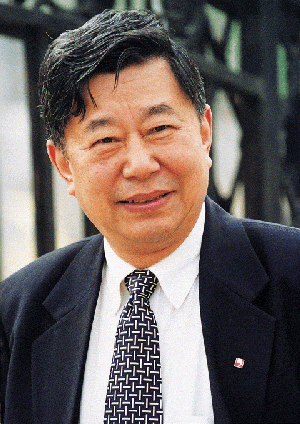Litterateur Lao She and his son Shu Yi
Lao She
|

|
Lao She
|
Lao She (1899-1966) was a noted Chinese writer. A novelist and dramatist, he was one of the most significant figures of 20th century Chinese literature, and is perhaps best known for his novel "Camel Xiangzi," or "Rickshaw Boy," and the play "Teahouse." He was of Manchu ethnicity.
Lao She was the pen name of Shu Qingchun, who was born into a poor family in Beijing. His father died when he was young, but he managed to work his way through Peking Teacher's College. After graduation he supported himself and his mother through a series of teaching and administrative posts. He served as a principal of an elementary school at the age of 17, and later he was a district supervisor. Lao She spent the years from 1924 to 1929 in London, where he taught Chinese at the School of Oriental and African Studies. By reading among others the novels of Charles Dickens, Lao She improved his English, and decided to start his first novel.
In 1931 Lao She returned to China and continued to write and teach in various universities. Partially modeling his work on Henry Fielding's "Tom Jones," Lao She turned to humor. He reversed his early individualist theme and stressed the futility of the individual's struggle against society as a whole. In "Rickshaw Boy" Lao She traced the degrading and ruin of an industrious Peking rickshaw puller, who finally dies on a snowy night.
The outbreak of the Sino-Japanese War (1937-1945) radically altered Lao She's views. Between the years 1937 and 1945 he wrote a number of plays, worked as a propagandist, and headed the All-China Anti-Japanese Writers Federation.
Between the years 1946 and 1949 Lao She lived in the United States on a cultural grant at the invitation of the Department of State. When the People's Republic was established in 1949, Lao She returned to China. He died in 1966, during the Cultural Revolution. His last novel was "The Drum Singers" (1952), which was published only in English.
Shu Yi
|

|
Shu Yi
|
Shu Yi, a well-known writer, literary critic and painter, was born in Qingdao in 1935. After graduating from the Kirov University of Forestry Technology in Leningrad, he returned to Beijing and worked as an engineer. He began writing in 1978 and was appointed deputy director of the Institute of Modern Chinese Literature in 1984. His publications include "Lao She," "The Last Two Days of My Father" and "Essays on Lao She."
Shu is proud of his father and loves him deeply. Most of his works are about his father. He tells stories of his father, a serious but not strict man, with strong feelings in his essays. He was deeply hurt by his father's death, which led him to become a writer, carrying on in his father's field.
